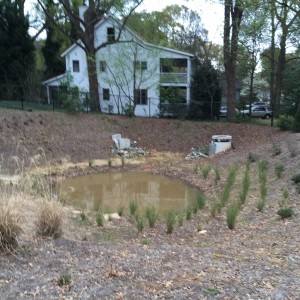By Susan Rose
Mosquitoes are an annoying menace which can ruin the fun of outdoor gatherings, gardening and recreational activities in Candler Park. Controlling mosquitoes is a “neighborhood effort” according to Gordon Stacey Cargal, environmental health county supervisor with the DeKalb County Board of Health. He spoke at the March CPNO meeting on March 21 and shared information on county efforts to control mosquitoes as well as tips for homeowners to eliminate mosquito breeding sites.
Cargal said the predominant mosquito in our area is the Asian Tiger mosquito, which has white stripes. An infected Asian Tiger mosquito can transmit the West Nile Virus with one bite. Cargal provided a DeKalb County Board of Health brochure describing West Nile Virus as a serious, even fatal, disease that affects the central nervous system. Controlling mosquitoes is critical to preventing West Nile virus infection.

“If you have mosquitos, then you are growing them yourself,” said Cargal.
Stagnant water is the primary breeding ground for mosquitoes. Even a soda bottle cap holds enough water to breed mosquitoes. Cargal provided residents with a weekly mosquito prevention checklist. The list includes dumping the water out of birdbaths two times per week and scrubbing to remove eggs. In addition removing water from containers like dishes under flower pots, toys, and buckets is essential. He also suggested turning wheelbarrows upside down when not in use.
Cargal explained the practice of the 5 Ds:
Dispose – get rid of anything that can hold water around your house and in the neighborhood (community clean up!) Cargal said that neighbors who do not address standing water can be cited for county code violations.
Drain – dump out containers after every rain. Don’t put saucers under outdoor plants. You can use larvicides (Mosquito Dunks or Mosquito Torpedoes) where water cannot be dumped.
DEET – wear mosquito repellant when outdoors. Keep repellent by the door as well as in the car.
Dress – wear lightweight long-sleeved shirts, long pants, and socks.
Daytime – Mosquitoes bite during the day and at dawn and dusk.
Cargal said that the county puts larvicide in storm drains and inspects/treats parks with larvicide where there is a problem of stagnant water. He described larvicide as a pheromone releaser which prevents young mosquitoes from becoming adults.
Although the Zika virus is not transmitted by the Asian Tiger mosquito, Cargal said Zika is a concern for Georgia. The Asian Tiger mosquito is a cousin to the mosquito which is transmitting Zika in South America.
The DeKalb County Board of Health, Division of Environmental Health, offers inspection services to help property owners identify and clean-up mosquito breeding grounds. The phone number is 404-508-7871, and the website is dekalbhealth.net. Cargal (Stacey.Cargal@dph.ga.gov) encouraged Candler Park residents to contact him with questions and for assistance with mosquito control efforts.
Stagnant retention ponds at Mary Lin worry neighbors
By Susan Rose
Two stagnant retention ponds at Mary Lin Elementary have long worried neighbors along Oakdale Road. One pond is located in the habitat area of the school property and situated immediately behind the homes on the odd-numbered side of Oakdale Road. The other pond is on Oakdale Road next to the gravel driveway leading to the rear of Mary Lin.

Although both ponds are contained by fencing, Mary Lin parents have expressed concern on social media about children’s safety because gates have been left unlocked and sometimes even open.
According to Kate Sandhaus in a Facebook post in the Mary Lin parents’ group, emails to Atlanta Public Schools (APS) officials from concerned neighbors began in 2010 when the ponds were unfenced large pools of water. Neighbors expected proper remediation of the problem with the renovation of Mary Lin. During and since the renovation, dozens of emails have been exchanged between the renovation project managers at APS, school leaders and neighbors. Yet, the ponds continue to sit with stagnant water due to improper drainage.
At the March CPNO meeting, members mentioned the problem to Gordon Stacey Cargal, Environmental Health County Supervisor with the DeKalb County Board of Health. Cargal said that the County can administer larvicide in the ponds as a temporary solution for mosquito prevention. However, Cargal said that stagnant water means that the drainage ponds were “not built right.”
The Oakdale neighbors continue to speak with APS about the problem. CPNO president Zaid Duwayri said that if there is no traction, the problem will be discussed at the April CPNO meeting along with a plan to escalate to APS superintendent Meria Carstarphan.